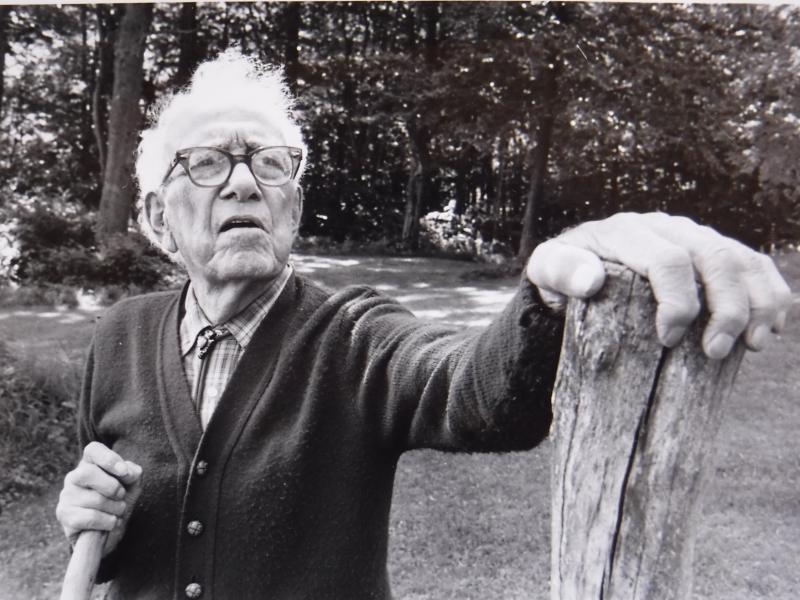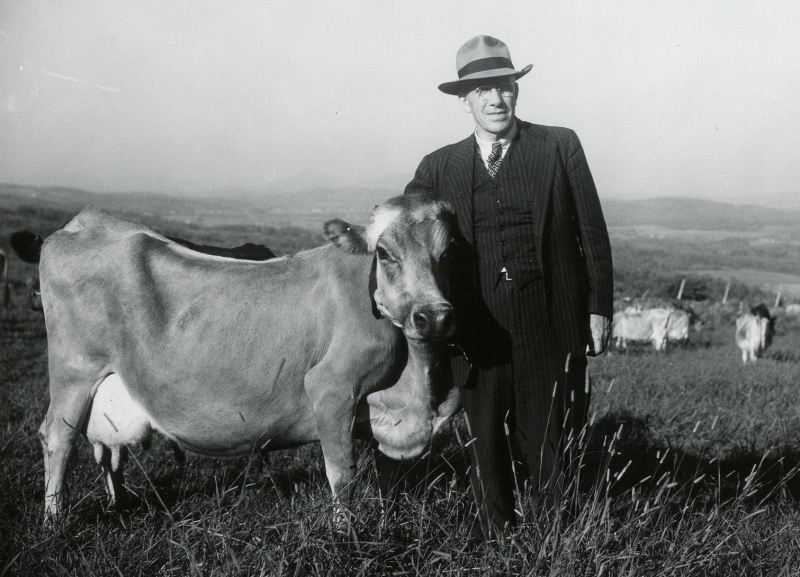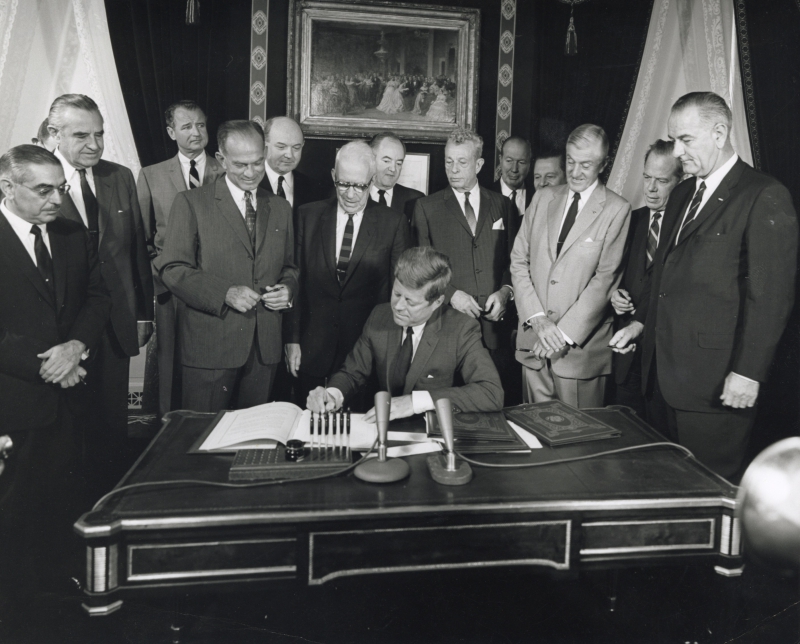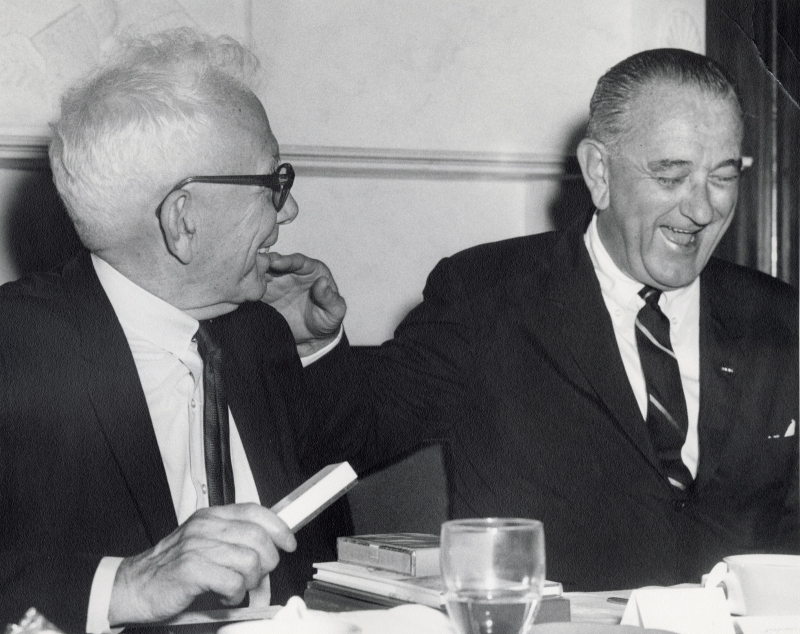Bookmarks: New Vermont page-turners
By Kevin O’Connor of VTDigger
Vermont’s original wild-haired political icon
A new book chronicles the late, legendary U.S. Sen. George Aiken of Putney
The wild-haired Vermont political icon needing no introduction seized the microphone to broadcast yet another communiqué on behalf of the common man.
“To represent the people one must follow them,” the Green Mountain Stater began. “Lincoln did. The Republican national leadership today does not.”
Sound vintage Bernie Sanders? Middlebury writer Steve Terry knows it actually came from another U.S. senator famous for cultivating the grassroots, championing the working class and challenging party machinery: the late, legendary George Aiken of Putney.
Terry first met the onetime Dean of the Senate as a fledgling reporter more than a half-century ago, then gained even greater access when he joined Aiken’s Washington, D.C., staff in 1969, leading to a friendship that lasted through the senator’s departure in 1975 up to his death in 1984.
“I often took notes on the events I witnessed,” the writer says. “I had always aspired to do a book.”

Writer Steve Terry works on his George Aiken book with University of Vermont research assistants (from left) David Brandt and Louis Augeri.
A half-century later, Terry finally has. “Say We Won and Get Out: George D. Aiken and the Vietnam War” is the first biography to recount not only the history of the politician’s headline-grabbing 1966 call for withdrawal but also a career that spanned five decades from the Great Depression to Watergate.
Older Vermonters know Aiken as the man who — first winning election as a legislator in 1930, speaker of the House in 1933, lieutenant governor in 1934, governor in 1936 and U.S. senator in 1940 — chose green for the color of the state’s license plates, coined the term “Northeast Kingdom” and spent $17.09 on his last re-election campaign in 1968.
But younger ones? “A whole generation has no idea who this person is or was,” the author says.
Born in 1892 on a farm since supplanted by Interstate 91, Aiken was a Brattleboro High School senior in the class of 1909 when he first stepped foot in the nation’s capital and shook hands with then President William Howard Taft.
Aiken initially wasn’t interested in politics, but instead plants. He worked as a horticulturalist — penning books on wildflowers, fruits and berries — before his 1920 election to the town school board sparked a half-century career in public service.

Vermont U.S. Sen. George Aiken upon retirement at his Putney home. (Photo: Michael McDermott/Brattleboro Reformer)
Back before the Interstate and internet brought Ben & Jerry’s and berniesanders.com, Vermont was one of the most rock-ribbed Republican strongholds in the nation. Aiken was a lifelong member of the Grand Old Party, although that didn’t mean he was a stereotypical one.
In Congress, Aiken raised a few eyebrows by eating breakfast every morning with then Democratic Senate Majority Leader Mike Mansfield. But he remains best known for a single paraphrased quote from a 12-minute speech — formally titled “Vietnam Analysis: Present and Future” — he gave in 1966.
“The United States could well declare unilaterally that this stage of the Vietnam War is over,” Aiken said, “that we have ‘won’ in the sense that our armed forces are in control of most of the field and no potential enemy is in a position to establish its authority over South Vietnam.”
Continuing on, Aiken explained how such an assertion could allow the nation to start to withdraw troops and seek a political solution to end the fighting. But the press, fellow politicians and the public soon summed up the speech as “declare victory and get out.”

Vermont U.S. Sen. George Aiken had a five-decade political career that spanned from the Great Depression to Watergate. Below: Aiken shares a laugh with President Lyndon Johnson.
“As a former reporter and editor and a person who had worked for six years as an aide to Senator Aiken, I never heard him once claim that he had been misquoted on his famous speech,” Terry writes. “In fact, as his Senate term came to an end in 1975 and until his death in 1984, Aiken was quick to say that the popular version was the correct interpretation.”
Aiken even seemed to echo it when speaking of a 1973 investigation of the Watergate scandal involving then President Richard Nixon: “Either impeach him,” he said, “or get off his back.”
In his last re-election campaign in 1968, Aiken faced a primary challenge from a conservative who charged the senator had the support of “communists, radicals and other left-wing extremists.” The incumbent went on to win with almost 75 percent of the vote. Ten days later, he filed a campaign finance report showing he had spent $17.09 — mostly for postage to put his name on the ballot.
Aiken was 80 years old and contemplating retirement when a freelancer convinced Vermont Life magazine to pay him 10 cents a word to interview the elder statesman. The aspiring scribe’s name: Bernie Sanders.
The contrast between Sanders and Aiken couldn’t be more striking: A young Brooklyn-born revolutionary conversing with the small-town Republican tagged by his congressional colleagues as “the wise old owl.” But the resulting story that ran in Vermont Life’s spring 1973 issue (and is reprinted in the book) shows a surprising degree of consensus between the two men.
Said Sanders: “There’s been some discussion lately about the state of Vermont being, in a sense, dominated or over-run by out of state interests. For example, a lot of the large Vermont industries are selling out to out of state corporations.”
And Aiken: “When you can’t stop it — you’ve got to guide it. I used to say that if you stand on the track and see a train coming down you can do one of two things. You can stand still and get run over, or you can hop on it and try to control it.”
Aiken retired from politics at age 82 in 1975 and lived another decade before his death at age 92 in 1984. The author caps his book with a chapter titled “What Would George Aiken Do Today?” The short answer: Continue to rebel against the establishment.
“Granted, the world of George Aiken was well before the advent of the 24-hour news cycle, social media platforms or a time when constant news was either generated or re-circulated by millions of Americans using Twitter, Facebook and many other forms of digital communications,” Terry writes.
That said, “If Aiken were in the Senate today,” the author concludes, “I believe he would surely be among the few Republicans challenging President (Donald) Trump.”
People can learn more about Terry’s book — published by UVM’s Center for Research on Vermont — on the website senatoraiken.com.
Reading list
Bartleby’s Books (17 West Main St., Wilmington; 802 464-5425; myvermontbookstore.com) has served as the Deerfield Valley’s independent community bookstore for 30 years. Located in historic downtown Wilmington, Bartleby’s is open daily 10a–6p, with extended hours during the summer. The store offers an up-to-date variety of new titles and perennial favorites, as well as cards, gifts, games and more. Explore online, come in and say hi, and load up with read reads! Here are a few staff picks, with hardcover prices, to get you started…
The Fountains of Silence
by Ruta Sepetys
$18.99, Philomel Books, 2019
 [Betty’s pick] From the author of Salt to the Sea, Out of the Easy, and Between Shades of Gray comes another novel with Ruta Sepetys’ trademark emotional impact and historically evocative setting. Sepetys’ writing has the unique ability to bridge the divide between young adult and standard adult fiction, making it a compelling read for a wide audience. This time Sepetys’ setting is the turbulent and repressive era during Spain’s dark post-civil war period when Francisco Franco’s violent, autocratic, and repressive government was in full swing. The author includes historical photographs, commentary, and reporting to bring the story alive. A beautifully told story about the consequences of war, love, and identity. I have enjoyed all of her books and this one does not disappoint.
[Betty’s pick] From the author of Salt to the Sea, Out of the Easy, and Between Shades of Gray comes another novel with Ruta Sepetys’ trademark emotional impact and historically evocative setting. Sepetys’ writing has the unique ability to bridge the divide between young adult and standard adult fiction, making it a compelling read for a wide audience. This time Sepetys’ setting is the turbulent and repressive era during Spain’s dark post-civil war period when Francisco Franco’s violent, autocratic, and repressive government was in full swing. The author includes historical photographs, commentary, and reporting to bring the story alive. A beautifully told story about the consequences of war, love, and identity. I have enjoyed all of her books and this one does not disappoint.
Small Days and Nights
by Tishani Doshi
$25.95, W. W. Norton & Co., 2020
 [Lisa’s pick] Grace escapes from her failing marriage in the United States to return to India to cremate her mother’s body. While there she discovers a sister she never knew she had who has been living in a residential facility run by nuns. Together they move to a house on an isolated beach south of Madras where they get to know one another. This corner of the world is about as far away from her life as Grace can get, but can the remoteness make her forget all that she is trying to leave behind? This book does a great job of examining the secrets in families and how they affect the relationships of all involved. The book’s setting creates a fascinating backdrop. Beautifully written.
[Lisa’s pick] Grace escapes from her failing marriage in the United States to return to India to cremate her mother’s body. While there she discovers a sister she never knew she had who has been living in a residential facility run by nuns. Together they move to a house on an isolated beach south of Madras where they get to know one another. This corner of the world is about as far away from her life as Grace can get, but can the remoteness make her forget all that she is trying to leave behind? This book does a great job of examining the secrets in families and how they affect the relationships of all involved. The book’s setting creates a fascinating backdrop. Beautifully written.
The Topeka School
by Ben Lerner
$17, Farrar, Straus and Giroux, forthcoming Oct. 1
 [Ana’s pick] In his third novel, The Topeka School, Ben Lerner explores the contemporary American emotional landscape, with a particular emphasis on white male aggression and its impact on our social fabric. Through the backdrop of middle America and a fictional psychoanalytic “institute,” Lerner’s novel is a survey of masculinity, intellectualism, and alienation that tackles both our current state of national crisis and the once-vague influences that brought us to the crosshairs that the United States now finds itself in.
[Ana’s pick] In his third novel, The Topeka School, Ben Lerner explores the contemporary American emotional landscape, with a particular emphasis on white male aggression and its impact on our social fabric. Through the backdrop of middle America and a fictional psychoanalytic “institute,” Lerner’s novel is a survey of masculinity, intellectualism, and alienation that tackles both our current state of national crisis and the once-vague influences that brought us to the crosshairs that the United States now finds itself in.
Lerner, who is also a poet, uses language with a heavy hand as he charts the paths of two disparate young men from 1990s Topeka, Kansas. Once members of the same childhood milieu, Adam and Derek find themselves on opposite ends of their social spectrum come adolescence. And it is in the blending of their two experiences that Lerner uses language as the focal point of his story. His writing may initially come off as ponderous and didactic, but Lerner uses his meaty tone to create a heavy atmosphere which lends itself to the weight of experience each boy is living as they, and their families and friends, head toward a final confrontation. The novel provides a window into the push and pull forces at play in our current political—and also social—environments, and it does so in a relatively unbiased manor, which is no small feat.
Olive, Again
by Elizabeth Strout
$27, Random House, 2019
 [Betty’s pick] To my surprise and amazement Olive is back! It is amazing that Strout is able to create a character, sometimes so infuriating, to someone so endearing. This wonderfully written novel begins where “Olive Kitteridge” left off, in the small town of Crosby Maine. It explores her life since Henry has passed away, her old and new relationships. For anyone that loved her in the first book, you are sure to love her even more! Olive never ceases to amaze me and she will always have a special place in my heart alongside my literary favorites.
[Betty’s pick] To my surprise and amazement Olive is back! It is amazing that Strout is able to create a character, sometimes so infuriating, to someone so endearing. This wonderfully written novel begins where “Olive Kitteridge” left off, in the small town of Crosby Maine. It explores her life since Henry has passed away, her old and new relationships. For anyone that loved her in the first book, you are sure to love her even more! Olive never ceases to amaze me and she will always have a special place in my heart alongside my literary favorites.
Medallion Status: True Stories From Secret Rooms
by John Hodgman
$25, Viking, 2019
 [Maria’s Pick] To say I love John Hodgman’s writing is an understatement. Vacationland, winner of the 2018 New England Book Award in the nonfiction category, was read aloud to anyone who would listen. As a part-time resident of the Berkshires and of Maine, his descriptions of the everyday life of these areas and the realization of his ineptitude at this rural life, its rules and mores, are so spot on and also very funny. Like, laugh-out-loud funny. Amazingly, he captures that relatability again with Medallion Status, which at first glance seems incredibly unrelatable, at least for this bookseller. Platinum Status at Beloved Airlines (his pseudonym for his preferred airline), access to secret societies, fancy A-list hotels and parties; see what I mean? But Hodgman, like so many of us, has notions on imposter syndrome, kinship, exclusion, loneliness, and the weirdness of everyday and famous-person life. I thoroughly recommend his books for those looking for social commentary with a dose of some observational comedy.
[Maria’s Pick] To say I love John Hodgman’s writing is an understatement. Vacationland, winner of the 2018 New England Book Award in the nonfiction category, was read aloud to anyone who would listen. As a part-time resident of the Berkshires and of Maine, his descriptions of the everyday life of these areas and the realization of his ineptitude at this rural life, its rules and mores, are so spot on and also very funny. Like, laugh-out-loud funny. Amazingly, he captures that relatability again with Medallion Status, which at first glance seems incredibly unrelatable, at least for this bookseller. Platinum Status at Beloved Airlines (his pseudonym for his preferred airline), access to secret societies, fancy A-list hotels and parties; see what I mean? But Hodgman, like so many of us, has notions on imposter syndrome, kinship, exclusion, loneliness, and the weirdness of everyday and famous-person life. I thoroughly recommend his books for those looking for social commentary with a dose of some observational comedy.
Ski Inc. 2020
by Chris Diamond
$29.95, Ski Diamond Publishing, 2019
 [Lisa’s Pick] Mount Snow’s former president, Chris Diamond, returns with his second book about the ski industry. The first Ski Inc. book, published in 2016, covered the ski industry’s past, while Ski Inc. 2020 focuses on the ski industry today and makes predictions for the future. Diamond dives into the consolidation that has happened with the two largest ski resort companies, known as the Big Two: Vail Resorts and Alterra Mountain Co. The timing of the book is spot on with Vail’s acquisition of Peak Resorts, owner of Mount Snow. A must-read for anyone working in the ski industry, for those who spend their time skiing, and for those whose business the ski industry touches.
[Lisa’s Pick] Mount Snow’s former president, Chris Diamond, returns with his second book about the ski industry. The first Ski Inc. book, published in 2016, covered the ski industry’s past, while Ski Inc. 2020 focuses on the ski industry today and makes predictions for the future. Diamond dives into the consolidation that has happened with the two largest ski resort companies, known as the Big Two: Vail Resorts and Alterra Mountain Co. The timing of the book is spot on with Vail’s acquisition of Peak Resorts, owner of Mount Snow. A must-read for anyone working in the ski industry, for those who spend their time skiing, and for those whose business the ski industry touches.























































